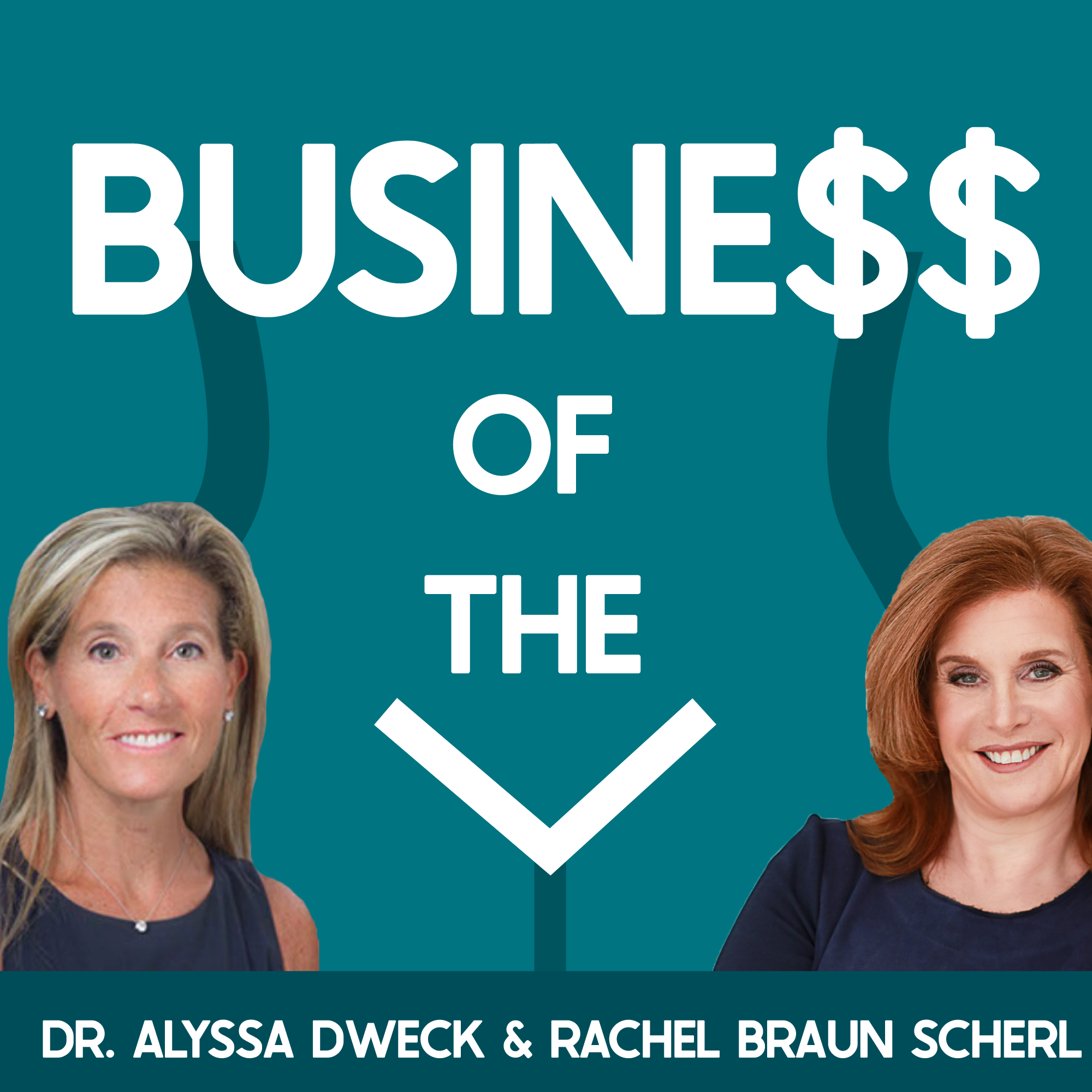
31.5K
Downloads
117
Episodes
Dr. Alyssa Dweck & Rachel Braun Scherl are here to introduce you to the most fascinating inventors, investors, thought leaders, and healthcare professionals who are in the Business of the V.
If you are a woman, know a woman, have a business, or care about your v health and wellness, this is the podcast for you.
Dr. Alyssa Dweck is a gynecologist, surgeon, and author. She’s an expert on V health who explores what’s on other women’s minds when it comes to periods, hormones, breasts, butts, and sex.
Rachel Braun Scherl is a marketing strategist, business builder, and vagipreneur - a person in the business of women’s sexual and reproductive health. It’s complicated!
Dr. Alyssa Dweck & Rachel Braun Scherl are here to introduce you to the most fascinating inventors, investors, thought leaders, and healthcare professionals who are in the Business of the V.
If you are a woman, know a woman, have a business, or care about your v health and wellness, this is the podcast for you.
Dr. Alyssa Dweck is a gynecologist, surgeon, and author. She’s an expert on V health who explores what’s on other women’s minds when it comes to periods, hormones, breasts, butts, and sex.
Rachel Braun Scherl is a marketing strategist, business builder, and vagipreneur - a person in the business of women’s sexual and reproductive health. It’s complicated!
Episodes
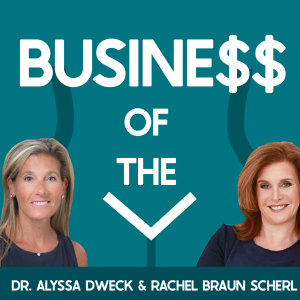
Wednesday Jul 24, 2024
Next-Gen Contraceptive and STI Prevention with Lisa Kinsella of LUWI
Wednesday Jul 24, 2024
Wednesday Jul 24, 2024
What would the opposite of a condom be? It’s the LUWI FINER LINER. Lisa Kinsella is the Founder and CEO of LUWI. The company exists to flip the status quo in women’s health by developing a new and improved solution for women that feels better while providing reliable, safe protection. Hear the “aha” moments that inspired LUWI, her distribution plan, how LUWI works, how the company is educating young women through their marketing, and what the testing and approval process was like. Tune in to this episode to find out how to launch a disruptive women’s health product!
LUWI is currently raising money on StartEngine - startengine.com/LUWI – so every person can invest in health equity and pleasure!
Learn more:
Today’s Hot Flash and other stats from:

Wednesday Jul 10, 2024
Wednesday Jul 10, 2024
There’s so much more we can do to transform women’s health. Carolee Lee is the Founder and CEO of WHAM (Women’s Health Access Matters). They’re dedicated to funding women’s health research to transform women’s lives. Hear what’s led to WHAM’s growth, how to properly collect data on women’s health, why communication is so key, the impact of menopause in the workplace, and how she measures success. Tune in to this episode to keep moving women’s health research and investment forward!
Learn more:
Today’s Hot Flash and other stats from:

Wednesday Jun 26, 2024
R&D for Women’s Health Products with Heidi Beatty of Crown Abbey
Wednesday Jun 26, 2024
Wednesday Jun 26, 2024
Proper R&D can make or break women’s health products. Heidi Beatty is the CEO of Crown Abbey, R&D experts who help their clients develop and launch new products, plus handle all aspects of Project Management. Hear why she’s the reason Alyssa and Rachel know each other, how to balance consumer needs vs. backlash from practitioners, how she tests women’s health products, why communication about ingredients and chemicals is so important, and how women’s healthcare compares in the US vs. UK. Tune in to this episode to help support the next great women’s health product!
Learn more:
Motivations for Intravaginal Product Use among a Cohort of Women in Los Angeles
Vaginal health and hygiene practices and product use in Canada: a national cross-sectional survey
What are the health effects of PFAS?
Today’s Hot Flash and other stats from:

Wednesday Jun 12, 2024
Women’s Cardiac Health with Dr. Suzanne Steinbaum of Heart-Tech Health
Wednesday Jun 12, 2024
Wednesday Jun 12, 2024
Few things are more important than your cardiac health. Dr. Suzanne Steinbaum is the Founder and CEO of Heart-Tech Health, a med-tech innovation to decrease the risk of women’s cardiovascular disease and bring prevention to every woman - regardless of location or circumstance. Heart-Tech Health has created Adesso, a comprehensive and holistic approach to having a baseline and understanding the elements of one’s heart health. Hear how she got into cardiology, why heart disease doesn’t get the attention cancer does, the huge benefits of diagnosing heart problems earlier, her approach to educating young doctors, and how she manages all the different aspects of her life. Tune in to this episode to shine a brighter light on women’s cardiac health!
Learn more:
Essential Components of CVD Prevention
Take the quiz to get your Heart Care Score:
Today’s Hot Flash and other stats from:

Wednesday May 29, 2024
Advancing Women’s Health with Sabrina Martucci Johnson of Daré Bioscience
Wednesday May 29, 2024
Wednesday May 29, 2024
For too long, women’s health has not been a priority in the scientific and clinical development community. For Daré Bioscience, that’s not ok. Sabrina Martucci Johnson is the Founder, President, and CEO of Daré Bioscience. She’s a life sciences executive committed to advancing improvements in women’s healthcare. Hear how she came up with the business model for Daré, why they went public, how long it takes to get women’s health products approved, how to think about hormones these days, and what new products they have in the works. Tune in to this episode to take women’s health to the next level!
Learn more:
Today’s Hot Flash and other stats from:
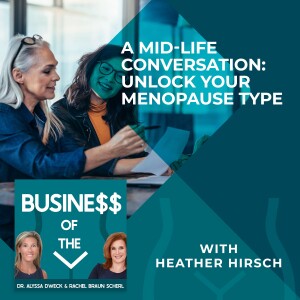
Thursday May 25, 2023
A Mid-Life Conversation: Unlock Your Menopause Type With Heather Hirsch
Thursday May 25, 2023
Thursday May 25, 2023
Menopause happens to women. And it affects everyone in society. But menopause is not a singular experience for everybody. Every woman has her own journey in this mid-life process. Heather Hirsch, CEO of Health by Heather Hirsch, brings her rare combination of intellect, energy, passion, and creativity to being an advocate and healthcare partner to mid-life women. Whether through social media, panel discussions, or sitting one-on-one with a patient, Heather knows she is making a difference in the lives of so many. As she says, “Women’s health affects everybody.” Let’s have this mid-life conversation today. Tune in to this episode, and let’s make it better for EVERYBODY!

Thursday May 18, 2023
What Happens When A Doctor And A Diva Meet On A Girls’ Trip With Kimba Williams
Thursday May 18, 2023
Thursday May 18, 2023
Kimba Williams' energy and passion explode off the screen as she talks about the auspicious meeting of her co-founder on a boat. The chemistry was instant and created the spark that resulted in Kushae. With a broad range of products for feminine care, the company is focused on providing effective, natural, and non-toxic health and hygiene products. Kimba also launched the Foaming Feminine Wash, the gateway drug for female hygiene. It’s interesting what happens when the doctor and diva meet on a trip. Tune in and discover the revolutionary, all-natural, effective solutions for vulvar care.
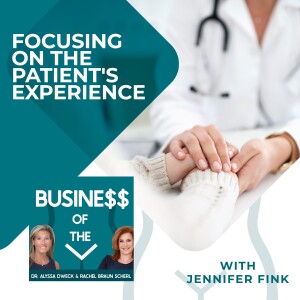
Thursday May 11, 2023
Focusing On The Patient’s Experience With Jennifer Fink
Thursday May 11, 2023
Thursday May 11, 2023
There is a concern in the industry towards providing safe and comfortable health procedures for women. Female founders have taken it in their hands to make this happen, just like our guest in this episode. Jennifer Fink, Chief Strategy Officer of Lutech Medical, focused on making sure the patient experience for women - whether after a trauma or a gynecological exam - is not fraught with anxiety, concern, and fear. Lutech's digital colposcope changes the interaction between healthcare providers and patients, reducing the potential stress and discomfort both physically and emotionally. Tune in to this conversation and discover how Lutech is revolutionizing the industry.
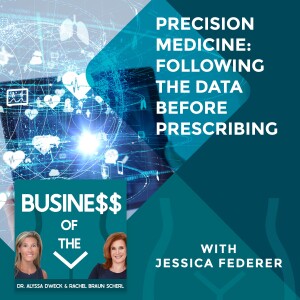
Thursday May 04, 2023
Precision Medicine: Following The Data Before Prescribing With Jessica Federer
Thursday May 04, 2023
Thursday May 04, 2023
Jessica Federer, Managing Partner of Supernode Ventures, has a passion for women's health. Her career starts working in government, transitioning to working with government and big pharma. Jessica combines her dynamic background into her new role. She brings her comprehensive approach to looking at women's health not as a point in time but as a multi-faceted challenge. In her line of sight, Jessica focuses on big problems that need better solutions - like cardiovascular health and autoimmune diseases. Listen to this episode and find the value of precision medicine with Jessica Federer.
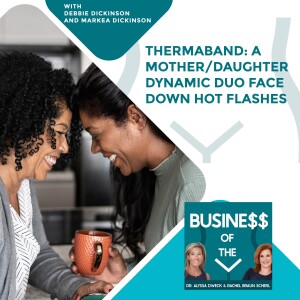
Thursday Apr 27, 2023
Thermaband: A Mother/Daughter Dynamic Duo Face Down Hot Flashes
Thursday Apr 27, 2023
Thursday Apr 27, 2023
Combine a mother and daughter, legal and business education and incredible experience to create Thermaband - a new way to manage hot flashes. In this episode, Debbie Dickinson and Markea Dickinson share their story of becoming mother-daughter entrepreneurs creating Thermaband. They discuss how they navigate the challenges of being entrepreneurs in the women's health industry, especially as “people in color”. We'll hear about their unique approach to communication, how they deal with disagreements and conflicts, and how they maintain a healthy balance between family and work. They also talk about how they came up with the idea of Thermaband, the development process, and how their business has grown over the years. Tune in to hear from this dynamic duo on how they face down hot flashes and the challenges of a mother-daughter relationship while navigating the joys and complexities of business.
